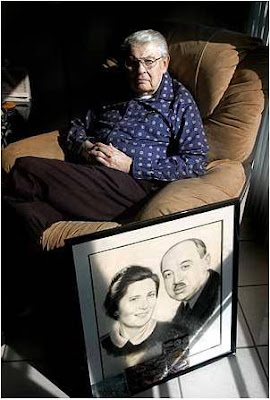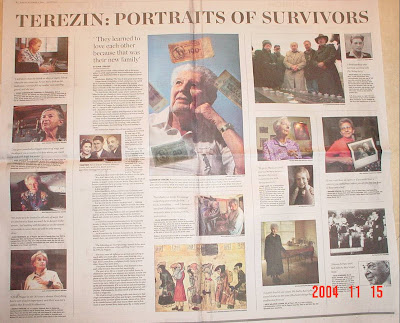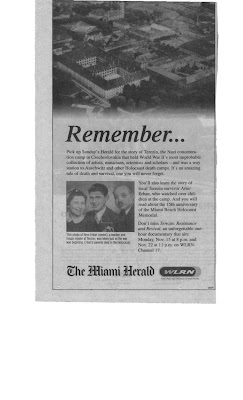
Saturday, June 27, 2009
Friday, April 4, 2008
Jews and Obama: Tolerating misinformation - Howard Salter - Politico.com
I get these e-mails almost daily as well. I got into a big argument the other day with a neighbor who kept saying that Obama is a Muslim and hates all Jews. Unfortunately, most of my neighbors (older Jewish retired) seemed to believe the same. I yelled at her. He is not a Muslim, and if he were a Muslim what's the problem? She kept on going that he went to a Madrassa school. (I did some research, and Obama went to a school in Indonesia at age 11, where most students are Muslim but there are many Christians as well, and it is open to all faiths -- of course most Indonesians are Muslim so you would expect the school to have most Muslims. My elementary school was 99% Catholic, which did not make me Catholic. The big problem with all this propaganda is that it creates more hatred from many Jews against all Muslims and blacks. As a son of Holocaust survivor, who lectures students every week about how Jews were singled out and most did not care when they were sent to concentration camps, it hurts me to see Jews descriminating against Muslims and blacks. I am a big believer that racism is driven by ignorance and insecurity. Let's be honest. The issue for some Jews is that he is a for many a "schwartze". I am a big supporter of Obama, and I hope he wins. Do not tolerate racist remarks for the good of humanity.
Carlos Erban
Monday, December 3, 2007
Carta de Arno Erban a Oppenheimer y su respuesta
Andres Oppenheimer
-----Original Message----- From: Arnoerban@aol.com [mailto:Arnoerban@aol.com] Sent: Thu 11/29/2007 1:45 PM To: Oppenheimer, Andres - Miami Cc: Subject: uno de sus admiradores
Estimado Andres
Soy Checo y despues de golpe comunista emigre a bella Venezuela.Ya el pais dejo de ser bello y asi vivo co mi familia en Miami. Me ocupo hablando, a los que se intereasan , de los origenes ,experiencias y cosecuencias de Holocausto. . Cuando Hitler gano democraticamente las elecciones, recuerdo,que mi padre decia.Este tonto terminara pronto, los Alemanes lo tumbaran en proximas elecciones y ademas lo que pasa en Alemania nunca puede pasar aqui. No hubo proximas elecciones. A toda mi familia asesinaron en camara de gas Yo pase anos en 5 diferentes campos de concentracion. Se, que este cuento no es nada nuevo pero hay que repetirlo de veces en cuando. Sus conferencias son muy importantes, abren ojos a mucha gente Yo trato hacer igual con mi tema. Me gustaria enormemente poder hablar con Ud. Si no, como dicen : El carino es el mismo.
Arno Erban No de Auschwitz B-13126
PS Mas informacion Elinor Brecher
Sunday, August 26, 2007
Saturday, August 25, 2007
Herald: Tales of Survival, Jan. 27, 2005


Posted on Thu, Jan. 27, 2005
TALES OF SURVIVAL
60 years after Auschwitz
BY SARA OLKON
solkon@herald.com
When the Red Army arrived to free prisoners at the Nazis' Auschwitz concentration camp in Poland 60 years ago today, the liberation held little meaning, at first, to those who had somehow survived.
Jan. 27, 1945, was simply another day in hell for people who had been isolated, forced on death marches or enslaved at munitions plants.
Liberation gave way to a new set of horrors: survivor's guilt. The knowledge that loved ones were dead or the uncertainty of not knowing. There was crippling illness. Often, they found, strangers had stolen their homes.
The Herald talked to some South Floridians who were prisoners at one time in Auschwitz, as well as a soldier who helped liberate a Nazi work camp, about the anniversary.
• Arno Erban
• Morris Rosenblat
• Kathy Berger
• Halina Laster
• Warren Melgaard and Leo Rosner
South Florida Commemorations
The Simon Wiesenthal Center will hold two candle-lighting programs. The commemorations are free, but reservations are suggested. Each program will be followed by a screening of the film Unlikely Heroes, which documents lesser-known stories of men and women who resisted the Nazis during World War II.
• Today: 7:15 p.m., Temple Beth Sholom, 4144 Chase Ave., Miami Beach. Call 305-538-7231.
• Feb. 2: 7:15 p.m., Temple Beth El, 333 SW Fourth Ave., Boca Raton. Call 561-391-8900.
Posted on Thu, Jan. 27, 2005
ARNO ERBAN
Arno Erban remembers concrete rows and the clunk of heavy boots at Auschwitz.
He remembers 3 a.m. head counts and rubber clubs, icy barracks where he slept across other angry bodies, as feet kicked at his shrunken face and torso. He remembers the smell of burning flesh and hair.
Erban was sent from Auschwitz to Jaworzno to Terezin. His liberation, falling about the same time Auschwitz was freed, is a jumbled blur. There had been gunfire outside for three days and two nights.
It was sunrise when Erban and some 30 other prisoners saw tanks coming in over the horizon. They sat together in their filthy and frailed prison garb and waited. At the time, the six-foot-tall Czech-native weighed 75 pounds.
''We didn't know who it was,'' said Erban, now 82. ``Then we heard some noise, words. We knew it wasn't in German.''
Russian soldiers handed out small bags of sugar and tins of lard and brought the prisoners to a nearby hospital. The first question at the door: Are you Jewish?
Hospital staff wanted to keep the Jews and non-Jews separate, Erban said from his home in Miami Beach.
Gun battles broke out again outside the rural hospital. Doctors, nurses and most of the Poles fled. Erban and the others went to nearby farms and begged for food.
``I was liberated several times. I died several times.''
Herald: Portrait of Terezin survivors, Nov. 14, 2004


Posted on Sun, Nov. 14, 2004 | ||
Portraits of Terezin survivors
BY ELINOR J. BRECHER
ebrecher@herald.com
Arno Erban holds a slim volume with a decaying spine, its pink pages graced with handwritten script so elegant and disciplined that it appears computer-generated.
Baudelaire. Kipling. The Czech lyric poet Josef Hora.
Erban doesn't remember which of the boys he cared for at Terezin Home No. 9 transcribed the poems -- there were hundreds -- but he points to the place where Hora's Thanks to the Fire ends in the middle of a line. Right there, says Erban, ``they took the boy to transport.''
To Auschwitz, the death camp, where millions perished in the gas chambers, their remains blasted skyward as fetid smoke through the crematoria chimneys.
Erban was little more than a boy himself when he entered the surreal world of Terezin in January 1942 at 19. Perhaps because he'd been active in the Boy Scouts and YMCA in Prague, he became house master of Home No. 9, a barrack with triple-deck wooden bunks, a table, and a handful of chairs.
For the two years until he was deported to the Auschwitz-Birkenau death complex in Poland, he was a teacher and father figure to boys ages 13-15.
They studied literature and math, played soccer and chess, wrote poems and painted pictures. Erban established a structure based on scouting, with points for good performance in everything from bed making to choir.
He insisted on respect for self and others, and daily good deeds. So when he saw two of his boys carrying a dead body on a stretcher to help out two old men, they got good-deed points for the day.
Home No. 9 didn't house the same 40 boys from beginning to end. Erban, now 82, never knew when the day started if any of his boys would succumb to a ''selection'' -- a euphemism for the death sentence of a transport to ``the east.''
Those selected went to the left; the others to the right.
''We don't know who was luckier,'' he says.
For his birthday in 1943, the boys gave him the book of poems, on paper stolen from the Nazis. They drew the beaver symbol of their scouting ''troop,'' and a dozen or so signed autographed the pages.
A few survived.
After Auschwitz, Erban survived the Geliweicz and Jaworzno camps, death marches, starvation and disease. He stood six feet tall and weighed 75 pounds when he was liberated by the Russian army in January 1945, and couldn't walk for three months.
For his role in the Terezin underground -- making contact with Czech resistance fighters outside the camp -- he became one of 18 civilians awarded the Czech Iron Cross after World War II.
He has three living children and one grandchild. He and his wife, Yolanda, have a bayfront flat in Miami Beach and a home in Caracas, where Erban settled after the war.
A retired accountant and secular Jew, he frequently speaks to Miami-Dade County students on the Holocaust. Given the popularity of body art these days, he chuckles that some kids think the B13126 tattoo on his left arm is ``cool.''
As he watches the Terezin documentary, he smiles at familiar scenes and faces, yet wonders if anyone who wasn't there can understand Hitler's insidious fiction.
* * *
The following are excerpts from a speech Erban gave at a reunion with some of his surviving ''boys'' on June 26, 1994, in Prague:
The boys were all different on arrival and looking so much alike very soon after. Some came from big cities, children of wealthy families; some came from a small village. Some came from a religious family. Some of them didn't know they were Jews.
This place became their home. They learned to love each other because that was their new family . . .
The part of my life as a leader of so-called 'home for children in captivity' now appears as a dream, distant and unrealistic.
I am certain that this was the most important phase of my life, both hard and most constructive. For more than two years, my only thoughts were the boys who were in my care. I tried to give them reason to live in spite of the jail environment. If it were not so sad and hopeless, certainly it would have give me much great personal satisfaction. Unfortunately, the final result of all these efforts ended so tragically. . .
We tried to create something noble and sincere in that tragic environment full of lies and danger, something that despite all the German efforts to make slaves of us, allow us to remain human with clear moral ideals and a firm basis to start normal lives, interrupted by so many years.''



